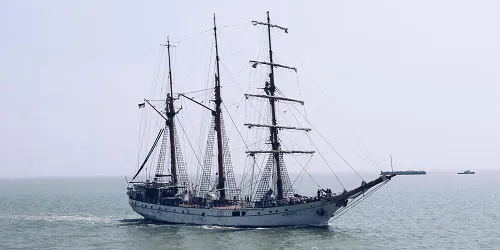-
Cruise Line InformationCarnival Cruise Line Cruising Guide & Tips Alcohol Prices & Selections Unlimited Soda Program "Cheers" Beverage Program Deck Plans Dry Dock Schedule Menus Food Recipes Beverage Recipes Secret Decks What's Included? What's Extra?
Celebrity Cruise Line Food Recipes Beverage Recipes
Disney Cruise Line Beverage Recipes
Holland America Line Food Recipes Beverage Recipes
Norwegian Cruise Line Cruising Guide & Tips Deck Plans What's Included? What's Extra?
Royal Caribbean Intl Cruising Guide & Tips Food Recipes Beverage Recipes Menus
-
Guest RegisterIf you are reading this it means you have not yet registered. Please take a second to REGISTER (it's FREE). You will then be able to enjoy all the features of Cruising Earth.
You should upgrade or use an alternative browser.
KRI Dewaruci #9 Oldest Active Military Ship - Cruising Earth

KRI Dewaruci - Indonesian Navy
#9 Oldest Active Military Ship
KRI Dewaruci is currently ranked #9 in the list of the Oldest Active Military Ships.
9
In Service:
1953
(72 Years of Service)Ship StatisticsTrack KRI Dewaruci
In Service: January 01, 1953
Gross Tonnage: 847 GT
Length: 191.00 Feet
Beam: 31.00 Feet
Speed: 10.5 knots / 12.1 mph
Complement: 156
KRI Dewaruci Historical Brief
Introduction
KRI Dewaruci is a renowned tall ship serving as a training vessel for the Indonesian Navy (Tentara Nasional Indonesia Angkatan Laut, TNI-AL). Named after a character from Javanese mythology symbolizing truth and courage, Dewaruci has been an iconic ambassador for Indonesia on the global maritime stage. This historical brief provides an overview of the ship's construction, design, operational history, and its contributions to naval training and international diplomacy.
Construction and Design
KRI Dewaruci was constructed in Germany at the H. C. Stülcken Sohn shipyard in Hamburg. The ship was launched on January 24, 1953, and was commissioned into the Indonesian Navy on July 1, 1953. Designed as a barquentine, Dewaruci features three masts with a combination of square and fore-and-aft sails, which allows for both aesthetic appeal and practical sailing capability.
The ship’s hull is made of steel, providing durability and strength to withstand the rigors of long voyages. Dewaruci’s design reflects the traditional tall ship aesthetic, with its majestic masts and intricate rigging, making it a visual symbol of maritime heritage.
Early Service and Training Role
From its commissioning in 1953, KRI Dewaruci has served primarily as a training ship for naval cadets of the Indonesian Naval Academy. The vessel provides cadets with hands-on experience in traditional seamanship, navigation, and teamwork. The training regimen aboard Dewaruci includes sail handling, knot tying, steering, and celestial navigation, all of which are essential skills for naval officers.
The experiential learning environment on Dewaruci is invaluable for cadets, as it instills discipline, leadership, and a deep understanding of maritime traditions. The ship’s role in training future naval officers ensures that the Indonesian Navy maintains high standards of seamanship and operational readiness.
Global Voyages and Diplomatic Missions
KRI Dewaruci is not only a training vessel but also an ambassador of Indonesian culture and maritime tradition. The ship has participated in numerous international tall ship regattas, naval reviews, and goodwill visits to ports around the world. These voyages serve as a platform for cultural exchange and diplomacy, showcasing Indonesia’s naval capabilities and fostering international goodwill.
Modernization and Continued Service
Despite being over 70 years old, KRI Dewaruci remains a vital asset to the Indonesian Navy. The ship has undergone several refits and maintenance programs to ensure its continued seaworthiness and operational capability. These efforts include updates to navigational equipment, hull repairs, and improvements to the living quarters for the cadets and crew.
In addition to its primary training mission, Dewaruci continues to participate in international tall ship events and naval exercises. These activities provide opportunities for cadets to interact with their counterparts from other navies, fostering mutual understanding and professional development.
Cultural Significance and Legacy
KRI Dewaruci holds a special place in Indonesian maritime culture. The ship’s name, derived from the Javanese wayang (shadow puppet) character Dewaruci, symbolizes the pursuit of truth and enlightenment. This cultural connection is reflected in the ship’s role as a floating ambassador of Indonesian heritage.
The ship’s design and traditional sailing methods preserve the maritime skills that have been passed down through generations. Dewaruci serves as a living museum of naval history, inspiring pride and reverence among Indonesians and maritime enthusiasts worldwide.
Dewaruci’s legacy is also evident in the numerous cadets who have trained aboard her and gone on to serve distinguished careers in the Indonesian Navy. The ship’s impact on their professional development and personal growth underscores its importance as a training platform.
Challenges and Future Prospects
Operating an aging tall ship like KRI Dewaruci comes with its challenges. The maintenance of a historic vessel requires significant resources and expertise. Ensuring the ship’s structural integrity and seaworthiness is an ongoing task that demands attention to detail and dedication from the crew and support staff.
Looking ahead, the Indonesian Navy is committed to preserving Dewaruci’s legacy. Plans for the future include continued participation in international events, further modernization efforts, and exploring ways to enhance the ship’s role in public outreach and education. The goal is to ensure that Dewaruci remains a vibrant and active part of Indonesia’s naval and cultural heritage.
Conclusion
KRI Dewaruci is more than just a training ship; it is a symbol of Indonesia’s maritime heritage, a platform for naval training, and an ambassador of cultural diplomacy. Since its commissioning in 1953, Dewaruci has played a crucial role in shaping the skills and values of Indonesian naval cadets, promoting international goodwill, and preserving traditional seamanship.
The ship’s elegant design, storied history, and ongoing contributions to naval training and diplomacy make it an iconic vessel in the Indonesian Navy. As Dewaruci continues to sail the world’s oceans, it carries with it the legacy of Indonesia’s rich maritime traditions and the promise of future generations of skilled and dedicated naval officers.
Cruising Earth Website Updates
The cruising industry is ever changing. The information contained on this site is updated frequently and kept as accurate as possible. If you believe any of the information is outdated, inaccurate, or you believe you have additional information that could be useful to other cruisers, please post the updated/new information in our Community Forums. Please use this same link to post any questions you may have.

